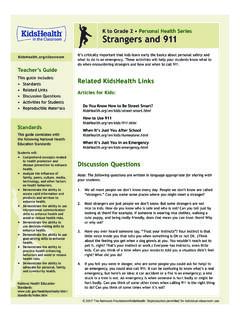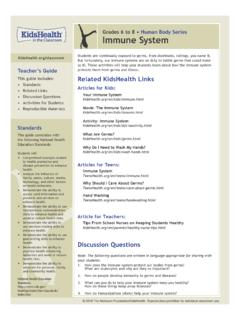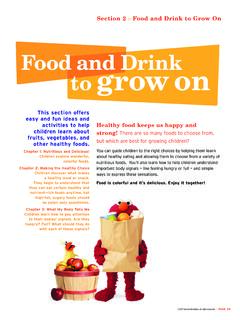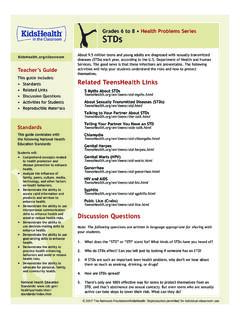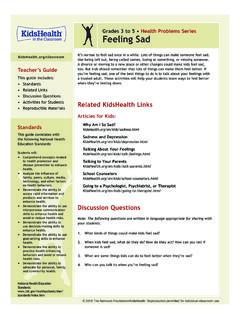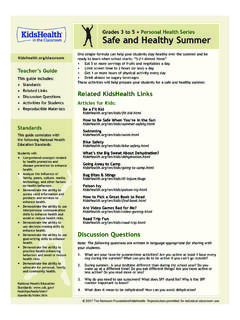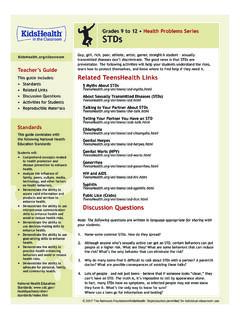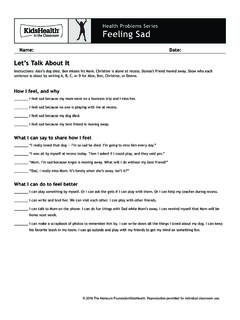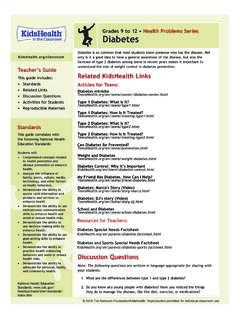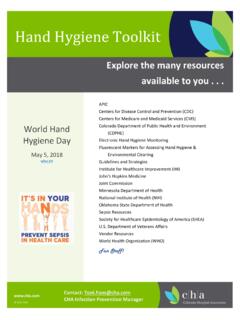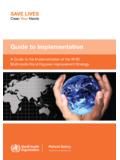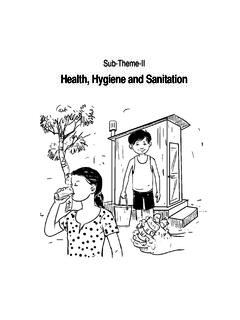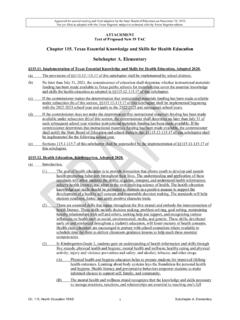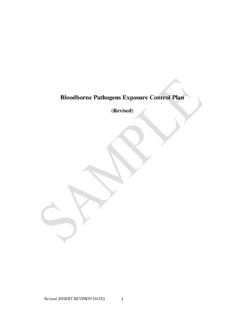Transcription of Teacher's Guide: Germs (PreK to Grade 2)
1 K to Grade 2 Personal health Series Germs Germs are tiny living organisms that can make us sick if we don't know how to protect ourselves from the harmful ones. The following activities will help your Teacher's Guide students learn about Germs and how to avoid them. This guide includes: Standards Related KidsHealth Links Related Links Discussion Questions Articles for Kids: Activities for Students What Are Germs ? Reproducible Materials Why Do I Need to Wash My Hands? Standards Why Does My Nose Run? This guide correlates with the following National health education Standards: Your Nails Students will: Checking Out Cuts, Scratches, and Abrasions Comprehend concepts related to health promotion and disease prevention to enhance health . Demonstrate the ability to use interpersonal communication skills to enhance health and avoid or reduce health risks. Demonstrate the ability to use decision-making skills to enhance health . Demonstrate the ability to practice health -enhancing behaviors and avoid or reduce health risks.
2 Discussion Questions Note: The following questions are written in language appropriate for sharing with your students. 1. Who can name a kind of germ ? What can Germs do to your body? Why do you think that Germs are bad for you? 2. What can you do to keep yourself safe from Germs ? Name some things that you can do to protect yourself. National health education Standards: 20015 The Nemours Foundation/KidsHealth. Reproduction permitted for individual classroom use. K to Grade 2 Personal health Series Germs Activities for Students Note: The following activities are written in language appropriate for sharing with your students. Skin: A Shield Against Germs Objectives: Students will: Demonstrate knowledge of Germs and how Germs can make people sick Illustrate and describe how skin protects the body from Germs Materials: Computer with Internet access 2 apples Paring knife 2 plates "Skin: A Shield Against Germs " handout Art supplies (colored pencils, markers, crayons).
3 Class Time: 5 minutes a day for 5 days Activity: Germs are on tables, on the floor, in the air - everywhere. Some even live on your skin. But your skin helps keep you from getting sick from Germs by blocking them from getting in your body. What could happen to us if we didn't have our wonderful skin? Let's find out by watching these two apples. The first one has a shiny skin protecting the soft inside part of the apple. But let's peel the skin off of this other apple and see what happens to it over the next few days. Using your "Skin: A Shield Against Germs " handout, draw what each one looks like over the next 5 days. What do you notice about the two apples each day? How are they alike? How are they different? What do you think might happen to each of these apples over time? Do you think they will stay the same as they are today? Why or why not? Extension: Why is it important to wash a cut or scrape on your skin with with soap and water and protect it with a bandage?
4 2015 The Nemours Foundation/KidsHealth. Reproduction permitted for individual classroom use. K to Grade 2 Personal health Series Germs Washing My Hands Objectives: Students will: Demonstrate knowledge of Germs and what they can do to the body Observe what happens to their hands when they play Demonstrate proper hand-washing techniques and explain the importance of washing hands Materials: Area to play outside or plastic tubs full of dirt Magnifying glasses Soap, sink, paper towels Washing My Hands handout Art supplies (colored pencils, markers, crayons). Class Time: 30 minutes Activity: All day long, your hands touch things that have lots of tiny Germs all over them. Today, we're going to take a close look at our hands after you've had some fun playing and we're going to learn what we can do to keep our hands clean. Let's go outside and dig in the dirt for a few minutes. Once we're back inside, we'll look at our hands with our magnifying glasses.
5 What do you think you'll see? [After playing outside.]. How do they look? Do you think it would be a good idea to go eat lunch right now? What could happen if you did that? The best way to get all those Germs off your hands is to wash them. But does it matter how you wash your hands? Let's find out. Half the class will wash their hands with just water. The other half will use soap and water. Then we'll look at our hands under the magnifying glasses again. What do you think you'll find? Now, color the pictures on your "Washing My Hands" handout and number them to put them in the right order. Reproducible Materials Handout: Skin: A Shield Against Germs Handout: Washing My Hands Quiz: Germs Answer Key: Germs is devoted to providing the latest children's health information. The site, which is widely recommended by educators, libraries, and school associations, has received the Teachers' Choice Award for the Family and the prestigious Pirelli Award for Best Educational Media for Students.
6 KidsHealth comes from the nonprofit Nemours Foundation. Check out to see the latest additions! 2015 The Nemours Foundation/KidsHealth. Reproduction permitted for individual classroom use. Personal health Series Germs Name: Date: Skin: A Shield Against Germs Instructions: Each day, draw a picture of what the two apples look like. Day Whole Apple Peeled Apple 1. 2. 3. 4. 5. 2015 The Nemours Foundation/KidsHealth. Reproduction permitted for individual classroom use. Personal health Series Name: Germs Date: Washing My Hands Instructions: Color the pictures and number each one so they're in the right order. 2015 The Nemours Foundation/KidsHealth. Reproduction permitted for individual classroom use. Personal health Series Germs Name: Date: Quiz 1. Germs are so small, you need one of these to see them: a) Stethoscope b) Telescope c) Microscope 2. If Germs get inside your body, you could: a) Feel them squirming around b) Get sick 3. Using soap and water: a) Makes Germs smell nice b) Kills Germs 4.
7 When should you wash your hands? a) After taking a bath b) After going to the bathroom c) After playing outside d) While you are sleeping e) Before eating 5. People should remember to cough or sneeze into their elbow or a tissue. Circle where you should put a tissue after you cough, sneeze, or blow your nose: 2015 The Nemours Foundation/KidsHealth. Reproduction permitted for individual classroom use. Personal health Series Germs Name: Date: Quiz 1. Germs are so small, you need one of these to see them: a) Stethoscope b) Telescope c) Microscope 2. If Germs get inside your body, you could: a) Feel them squirming around b) Get sick 3. Using soap and water: a) Makes Germs smell nice b) Kills Germs 4. When should you wash your hands? a) After taking a bath b) After going to the bathroom c) After playing outside d) While you are sleeping e) Before eating 5. People should remember to cough or sneeze into their elbow or a tissue. Circle where you should put a tissue after you cough, sneeze, or blow your nose: 2015 The Nemours Foundation/KidsHealth.
8 Reproduction permitted for individual classroom use.
